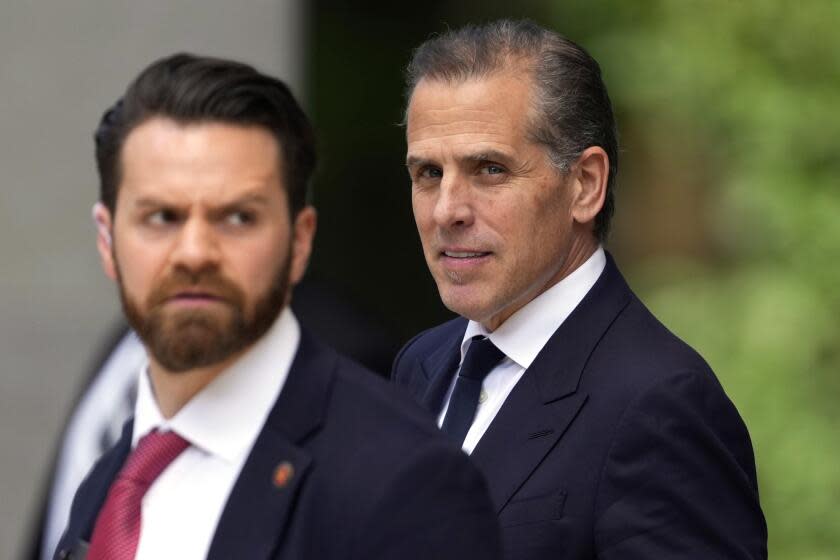A hometown jury decides Hunter Biden's fate: 'It's time to end this case'

Before the jury began deliberating Monday about whether to find Hunter Biden guilty of illegally buying a gun while he was addicted to crack cocaine, federal prosecutors called out the elephant in the courtroom.
Sitting in the front row were First Lady Jill Biden, President Joe Biden's sister and brother, Hunter's wife, Melissa Cohen Biden, and several other relatives and associates.
"The people sitting in the gallery are not evidence," said Leo J. Wise, the Senior Asst. Special Counsel. Jurors may have recognized the boldfaced names from the news and might have seen them react to evidence or testimony, Wise said. "Respectfully, none of that matters."
"No one is above the law, and this case stands for that simple proposition," Wise said.
So began the closing arguments in Hunter Biden's criminal trial here in the Biden family's home turf of Delaware, capping an extraordinary five days of testimony about the depths of the president's son's drug addiction as prosecutors seek to convict him of three felonies: lying on a federal background check form about his crack habit in order to buy a Colt revolver, giving a false statement to a federal firearms dealer and possessing a gun while being an illicit drug user.
When defense attorney Abbe Lowell came to the dais in the fourth-floor courtroom for his 90-minute closing argument, he lambasted prosecutors for singling out Hunter Biden's mom, wife and sister.
"It’s time to end this case," said Lowell, urging jurors to focus on the holes in the evidence: that no witness saw Hunter using drugs in and around the 11-day period when he owned the handgun, that his memoir published years later was not a diary indicative of his state of mind, and that text messages from months or years before or after he bought the gun do little to elucidate how he "knowingly" filled out his background check form.
"We have had Hunter's life in our hands," Lowell told the panel. "But now, I have to give it to you."
The jurors deliberated for about an hour before leaving for the day and are scheduled to resume Tuesday morning. If convicted of all three counts, Hunter faces years in prison and steep fines, though first-time offenders typically see little to no time in custody.
In his hour-long summation of the case, Wise — a longtime federal prosecutor — walked through the evidence: that Hunter Biden had used crack cocaine for years and that he walked into a Wilmington, Del., gun shop on Oct. 12, 2018, and purchased a Colt revolver.
When a federal background check form asked whether he was an unlawful drug user, Biden checked "No." The gun remained in his possession until Oct. 23, 2018, when his brother’s widow, Hallie Biden, said she found the gun in Hunter's truck, tossed it into a leather pouch and disposed of it in a trash bin outside a high-end grocery store.
Once Hunter found out, he urged Hallie to call the police. The gun was recovered days later from the home of an elderly man who picks up plastic bottles and other recyclables.
In an effort to prove the charges, prosecutors embarked on a detailed exhumation of Hunter Biden’s drug use, drawing on his 2021 memoir, "Beautiful Things"; his text messages; bank records, including more than $150,000 in cash withdrawals in the months surrounding the gun sale; and testimony from his ex-wife as well as a former stripper turned girlfriend and Hallie Biden, who dated Hunter after her husband died.
“To be clear, the evidence was personal, it was ugly, and it was overwhelming,” Wise told jurors. “It was also absolutely necessary.”
Prosecutors noted that Zoe Kestan, the ex-stripper, had testified to witnessing Hunter use crack in September 2018, shortly before the gun purchase, including at the Freehand Hotel in downtown L.A. and in a Malibu rental home.
“He had been to rehab, over and over,” Wise said. “He knew he had an addiction when he bought the gun.”
Wise also pointed to the days after the gun sale, when in text messages, Hunter told Hallie Biden, cryptically, that he was “buy-ing,” and later, that he was “sleeping on a car smoking crack on 4th street and Rodney,” an intersection in downtown Wilmington, adding, “There’s my truth.”
“Take the defendant’s word for it — that’s his truth,” Wise said.
Lowell, however, reminded jurors about what Hallie Biden said on the witness stand — that Hunter often lied to her about his whereabouts and that their relationship was often tempestuous.
The defense attorney also walked through the day when his client bought the handgun at StarQuest Shooters & Survival Supply, where salesman Gordon Cleveland had earned the nickname “whale hunter” for his ability to identify well-heeled patrons and sell them expensive guns.
Hunter Biden had been at a nearby AT&T store when he walked into the gun shop and eventually purchased a gun, a knife, a BB gun, ammo and a speed loader.
And Lowell returned to the paperwork — the federal background check form — at the center of the case. The lawyer reminded jurors that the question about drug use was posed in the present tense — “are you” an unlawful user or addicted to drugs?
“This doesn’t ask what Hunter thinks of himself in 2024,” Lowell said. Cleveland, the only gun shop employee who interacted with Hunter, testified that Hunter was not glassy eyed or under the influence, Lowell noted.
Nearing the end, Lowell reframed how Hallie Biden had removed the gun from Hunter Biden’s car, emphasizing that it was she who dropped it in a supermarket trash can, while Hunter told her to immediately call police.
Pointing to how Delaware State Police reported the case when officers arrived at the supermarket, Lowell said, Hunter was “the victim the entire time.”
This story originally appeared in Los Angeles Times.


